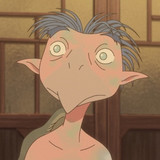#FEATURE: Is Reiner Braun The True Heart Of Attack on Titan?
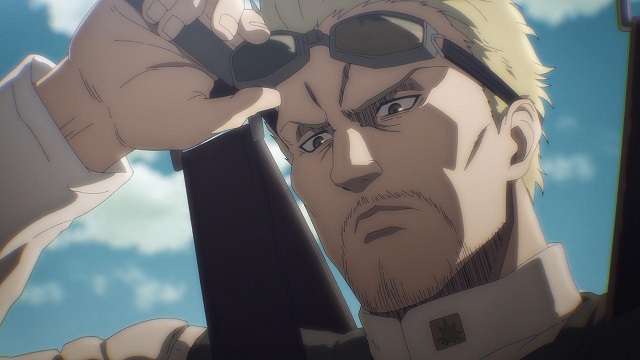
“#FEATURE: Is Reiner Braun The True Heart Of Attack on Titan?”

Through all of the twists and turns in the tumultuous plot of Attack on Titan, no matter how much changes about its presentation, one thing remains the same: the series is, and has always been about, freedom. Whether that freedom be from the Titans outside the Walls at the beginning, from the grip of the tyrannical ruling class in the middle, or the complex world-spanning conflicts of the final arc, all of the characters are ultimately fighting for the same things in their own ways. Part of the ever-evolving nature of Attack on Titan's story is that the characters evolve similarly. We can see that in obvious ways, like Eren's journey from angry little boy to dubious anti-hero or Mikasa's wavering faith in Eren, but the one whose arc is most interesting — and reflective of Attack on Titan's ultimate point — is that of the Marleyan Titan Warrior, the Armored Titan himself, Reiner Braun.
In fact, at every stage of the story, Reiner represents the beating heart of strength at the core of Attack on Titan.
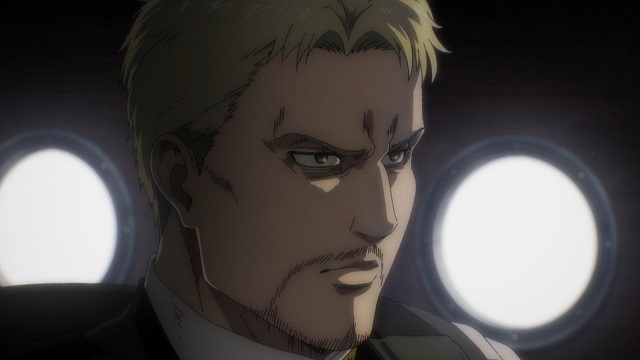
When Reiner is first introduced, we see him as a large, intimidating boy, a presence we can't ignore. He stands tall, one of the most outwardly confident of the cadets at the start of the story; at a time when the characters are still finding their footing, preparing to take on the ferocious Titans themselves and even dying left and right, Reiner seems almost unfazed by the danger around him. He's a pillar the cadets can turn to in hard times, like a big brother for the rest of the kids. Where the other more mature characters are either emotionally distant, like Annie, or too aloof to be figures of strength, like Ymir, Reiner is someone characters like Eren can and do turn to for support when they're feeling weak. In early Attack on Titan, Reiner represents the kind of tenacity one needs to survive in a harsh world like the one inside the Walls, and that's exactly what we need at a time when we believe the danger is as simple as the Titans.
That certainty in trying times that Reiner represents is what makes his betrayal, the confession that he is in fact the Armored Titan who helped destroy the Walls and started the whole series off in the first place, so shocking. Just when we believe we've found something we can rely on in a world that seems constantly on the edge of ending, the pillar of certainty Reiner represents collapses. It's a memorable moment because of how sudden it feels. Such an important revelation, a question in the minds of everyone since the concept of Titan shifters was first revealed, dropped on us — and Eren! — unceremoniously. Even Bertholdt, the Colossal Titan and Reiner's co-conspirator all this time, is taken aback by Reiner's statement. Then, while Eren is captured and helpless, Reiner tries to explain himself even more to Eren, leaving us bewildered at his words. It's all so confusing and fast, and even as Eren eventually makes it out safe, we're left to wonder if we can trust anything. Reiner ends up representing the turmoil and uncertainty the world is always able to throw at us even when we think we've found our footing.
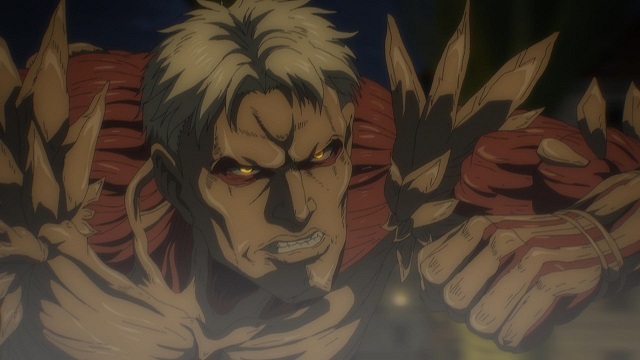
Unbeknownst to Eren and company, though, despite being the original enemies of humanity in the Walls, Reiner and Bertholdt aren't even the ringmasters of the entire operation. We meet Zeke, the powerful and intelligent wielder of the Beast Titan, and eventually the country of Marley, for whom Reiner and even Zeke are acting as pawns in a century-long worldwide conflict. Reiner, we learn, was only a child when he, Annie, and Bertholdt infiltrated the Walls, and the mission they were on was itself not even considered very significant by the people that sent them on it. Reiner is just a boy who believed that by joining the army he could validate his existence in the eyes of his country and win back the love of his father — neither of those things is really true. He's at his lowest, coming home without their goal achieved, feeling like a complete failure. The tall, imposing Reiner we knew from the beginning of the series seems tiny and weak against the scale of the systems that we understand by this point of the story, and it makes us question if anything can truly be relied upon in such a merciless world.
But if we take a look back at Reiner's story again, knowing everything we do about him now, we find a different message, one of strength and hope in the face of endless adversity. At the beginning, when Reiner is the big brother of the group, he is actually doing his best to imitate Marcel, both to carry on Marcel's legacy and to be a good leader for Annie and Bertholdt. They aren't, after all, relentless killers, but kids who have been forced to survive in an unfamiliar world, and Reiner recognizes that one of them needs to look like a leader, even if he doesn't feel like one. When he reveals his true identity to Eren, he isn't doing it as part of a grand masterplan, but as a last-ditch effort to salvage a situation he can tell is going south for him and his friends; he's just as, if not more, scared and confused as the people around him, and you can tell from how he seems to believe Eren will somehow cooperate with him if he just explains things. When he and Bertholdt report to Zeke, Reiner isn't telling stories of victory, but of consistent failure, and when they return to Marley down two Titans and nothing to show for it, it's almost like all of Reiner's efforts have been for naught. It's this Reiner that feels the most real, the most like someone who has grown up and lived in a world as devastating and cold as the one of Attack on Titan.
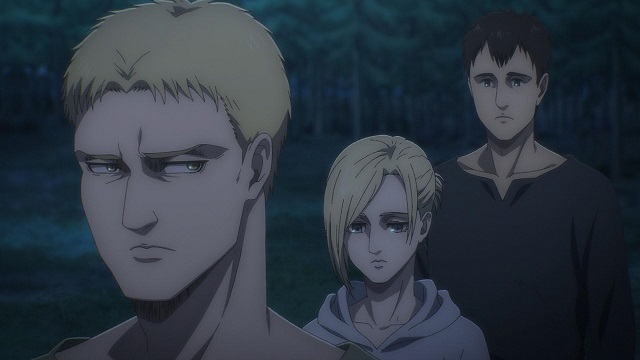
Through the exposure of his weakness, we come to see the strength Reiner represents once again, a more real kind of fortitude than the false one Reiner seemed to represent at the beginning of the story. Reiner finds his strength in the desire to protect his loved ones, from Bertholdt to Gabi. He carries on in moments like his confession to Eren because he is always looking for the light at the end of the tunnel, even as he makes mistakes along the way, like we all do. He takes the initiative to attack Paradis before Zeke and Eren can enact their final, devastating plan because he knows someone has to take the lead, just like how he took the lead after Marcel's death as a kid. At every turn, Reiner chooses not to lose himself in despair or forget what he's fighting for.
By building Reiner up and taking him down the way his arc does over the course of the show, Attack on Titan shows us what it thinks true strength in the face of adversity is: being willing to stand up again after loss and hardship, prioritizing the things that matter like the well-being of your loved ones and fighting for your freedom with all of your heart.
Who is your favorite character in Attack on Titan? Tell us about them in the comments below!

David Lynn can be found obsessing over Fate/Grand Order and D4DJ Groovy Mix on Twitter @navycherub.
Do you love writing? Do you love anime? If you have an idea for a features story, pitch it to Crunchyroll Features!
If you liked the article, do not forget to share it with your friends. Follow us on Google News too, click on the star and choose us from your favorites.
For forums sites go to Forum.BuradaBiliyorum.Com
If you want to read more anime-manga articles, you can visit our anime-manga category.

